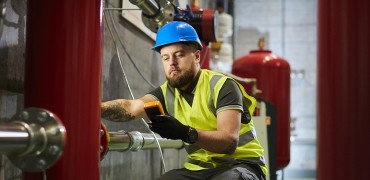You might not have gone to the trouble of ringing it on your calendar, but April 22nd was celebrated as Earth Day.
An occasion first proposed in 1970 by a Wisconsin Senator to increase awareness of the environment as a political issue, growing concerns about climate change has seen the day become a global event recognised by more than 190 countries.
Each year, people around the world mark the day by taking part in various activities such as tree planting, beach cleaning, recycling drives, and educational events to promote environmental awareness and encourage sustainable practices.
it offers a way for you to enhance your reputation and gain a competitive edge
More than a buzzword
For many businesses, it presents an opportunity to let the public know about what they are doing to protect the planet and highlight their commitment to sustainability and social responsibility, and press releases were duly issued relating efforts to reduce ecological footprints and establish environmental credentials.
Such pronouncements might be greeted with a healthy dose of cynicism, but there’s no doubt that sustainability has graduated from a mere buzzword to a fundamental necessity for many businesses across all sectors.
There are compelling reasons why companies should prioritise sustainability, not only for ethical reasons, but also for strategic advantages and economic benefits. Potential customers and investors are no longer solely judging their performance based on profit margins or market share, but by what they are doing to reduce their impact on the environment.
Practice what you preach
For installation companies and contractors looking to promote the environmental benefits of heat pumps and other low carbon technologies, there is an obvious motivation to be seen to practice what they preach.
Many customers, whether it's an individual homeowner, local authority or larger corporate body, will want to know that the company they are buying from share their concerns about the importance of sustainability and ethical business practices.
Unfortunately, however, while you might be very proud of the steps your company has taken to help the country progress to net zero, there are not many customers out there who would be happy to take your word for it.
Third party validation is therefore crucial to ensuring that your customers and business partners can see that they are working with like-minded companies across the supply chain.
Help for installers
With this in mind, last year saw Mitsubishi Electric launch its own carbon reduction programme, providing a way for installers to receive accreditation as an official Committed Carbon Reduction Partner (CCRP).
As well as supporting companies in their efforts to reduce their own carbon emissions, it offers a way for them to enhance their reputation and gain a competitive edge over businesses that may not share the same values.
Under the scheme, accredited heating and air conditioning installers, who will need to be signed up to Mitsubishi Electric’s Partner Programme, will be provided with a marketing toolkit to help promote their status, including a certificate, CCRP logo and listing as an accredited Partner on the manufacturer’s website.
In return to their commitment, installers will be advised on how to calculate their carbon footprint, set targets and devise effective carbon reduction strategies.
On a mission
Watford-based heating installation business Sustain Homes, a nationwide installer of solar PV, battery systems and renewable heating solutions, was one of the first to achieve accreditation.
“We see our mission as delivering peace of mind for our customers whether it’s in the products we install or the service and support we provide and that means being able to show our extensive knowledge about sustainability,” explains MD Adam Morse.
“From the vehicles we drive through to how we tender for business, the road to net zero is already having an impact on every area of our business, and a big part of this challenge is navigating the white noise around sustainability, focusing on what we can, and need to deliver now to prepare for the future.”
Sound reasons
Not everyone may be as passionate as Adam about the need to reduce their environmental impact, but there are still many sound business reasons to strive to become a more sustainable business, not least of which is addressing your energy use and wastage of materials.
Not only will it help to save money, but it can only enhance your company’s reputation as a responsible corporate citizen, which can lead to increased loyalty from both customers and employees – and if you can do a bit to save the planet at the same time, well that has to be a bonus.
Chris Jones is editor of PHAM News




